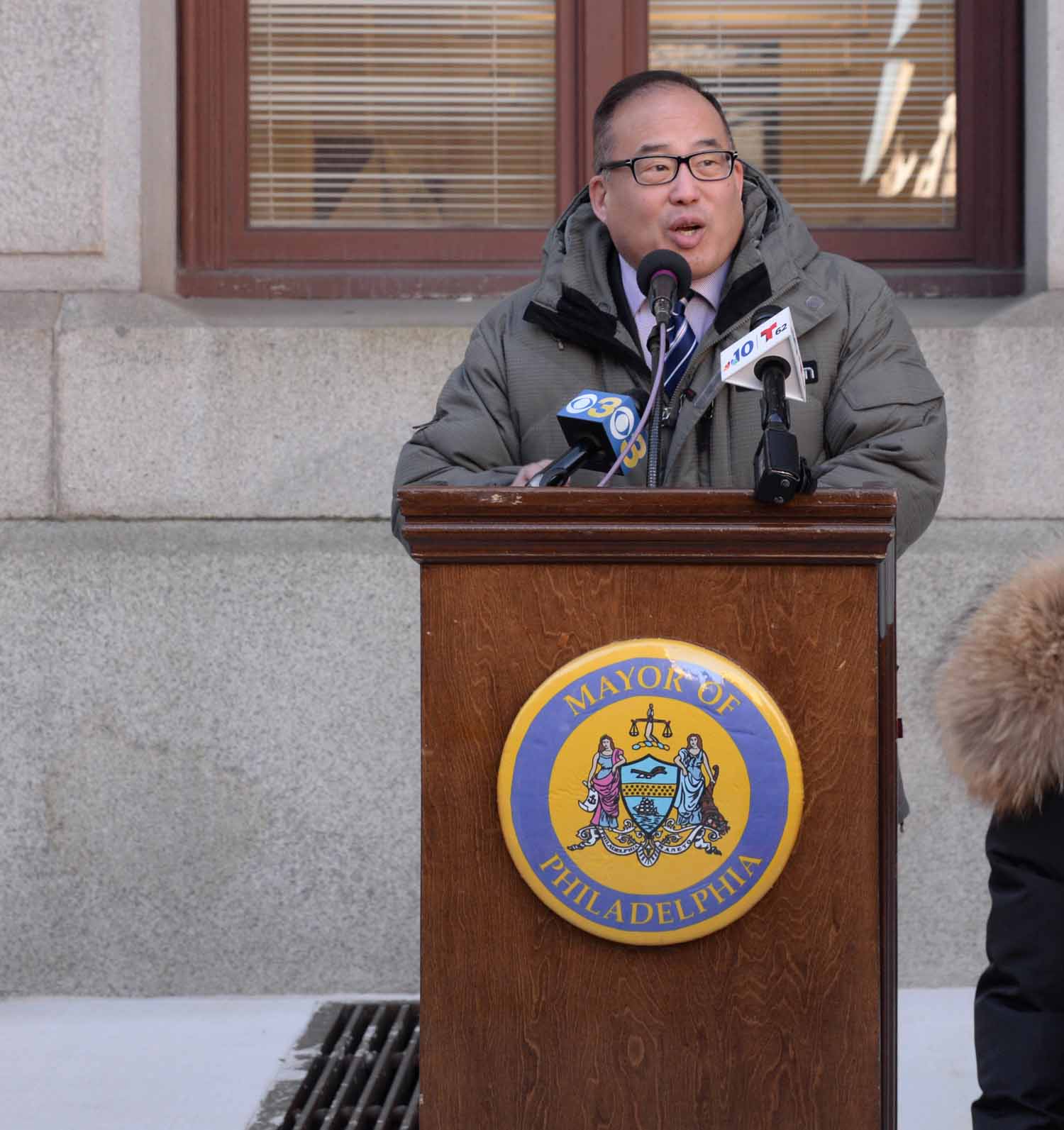
Getting to know City Councilman David Oh: An
 Talks Segment
Talks Segment
City Councilman David Oh sat down with AL DÍA to discuss the controversial soda tax, the recently passed Fair Workweek legislation, violence in the city, the…
In early January, City Councilman David Oh visited AL DÍA's offices to discuss some of the most pressing issues facing the city today, and his approaches to addressing them. First elected in 2011, the Republican councilman was the first Asian-American ever elected to public office in the city. This year, he is running to be re-elected for what would be a third term in office.
The following interview has been condensed. You can tune into the podcast embedded below for the full interview.
From my perspective, we had the money in the budget. It wasn’t being explained what it was for - we were creating a tax on the poor, and it was for the purpose of raising money. If it was for health, then I think we could have dealt with it in another manner. I don’t have a problem with doing that - health for health’s sake. But, then you end up in a strange situation where you say you don’t want people to drink sodas for health reasons, but if they don’t drink sodas we don’t have money. So, we want money, so we end up in the odd situation of, in reality, getting money from people who need it more than others. So, if we have money in the budget, let’s spend that.
If we can provide better wages and better working conditions without losing jobs, I’m all for doing that. If, on the other hand, by trying to provide a level of predictable scheduling, which I don’t see increases jobs - to me these jobs are either there because people need those jobs and they can maybe get greater skills, or improve their working conditions. Or, those jobs are the type of jobs people have as they are pursuing other things. They’re convenient.
Predictive scheduling to me does not increase jobs. There’s only a certain number of work hours you’re going to have, so by predictive scheduling you’re reducing the number of people who do those jobs, you’re creating some kind of predictability, which I think is good, but I really thought it could have been worked out better. And I think that there were certain employers that should not have been included in the predictive scheduling because there were no complaints about those fields of work, and they had not been included anywhere else in the nation.
It’s kind of contradictory that we want safe communities, but we don’t want to put people in prison. We want people back in neighborhoods and that is what we’re doing. I’m not saying we shouldn’t. I’m all for criminal justice reform. I did a resolution about reforming the Post-Conviction Relief Act in Harrisburg. I filed myself a pardon for someone I believe wrongfully incarcerated. We have to improve the criminal justice system, but at the same time a lot of crimes are crimes of anger, crimes of passion or frustration, and otherwise crimes of economic opportunity, be they drug dealing or robberies or things like that. I believe violence starts in the heart. You can take as many guns off the street as you’d like, but if you don’t change people’s how they view things, and how they perceive - and part of it is also what kind of examples that we’re setting.
I think forgiveness is a very important thing, i think learning to communicate with each other, and be tolerant of each other. I think lots of aggressive language in non-aggressive situations that we see in public, that’s not a good thing. But, at the end of the day, fundamentally, our job in government is to provide safe communities, good education, and to create opportunities for employment and betterment so that people don’t have to resort to, or don’t find themselves resorting to, criminal activity.
RELATED CONTENT
Where I don’t agree with some of the things I see - and I don’t know yet, because, like many people, I’m an observer, I’m hoping he does well, I’m hoping he’s successful - but I am concerned that fundamentally in a criminal justice system there is a judge and a jury. They decide. You have a defense attorney whose job is to represent the individual, to raise a reasonable doubt, and there is a system that if they’re a danger to the public, or to people, that safeguards those folks, and hopefully rehabilitates and hopefully gives skills to the person who’s incarcerated.
But, the District Attorney’s job is fundamentally to represent the victims and potential victims. And yes, there is a point where you can deal with the wolf in order to protect the sheep. But, the fundamental nature of the District Attorney is to protect the sheep from the wolf.
We have become very focused on being sympathetic to persons that are addicted to drugs. To the extent that I think we’re not helpful. We’re not doing prevention, we’re not doing education, and while we argue about whether or not we’re going to do safe injection sites, where is the money for the existing treatments? We have encampments, they tend to bring more and more people into our city under the idea that we do tolerate, and allow, and sympathize with drug addiction. And, I think that is problematic.
I think part of it is that we have to do things that are most productive, that are most beneficial to the public good. There are a lot of situations, and I’m very sympathetic to them, where it takes intensive effort, and I hope we use them. But, doing intensive effort for the few at the cost of the many is a way to continue to grow this problem.
There are a lot of people who can do it without any consequences, understood. Just like there’s a lot of people who go gambling or drinking without any consequences. Some things that are not good for you, like cigarette smoking and gambling, they can be addictive, and they could ruin your life, right? The drugs have been more problematic for people, and certain drugs much greater than others. I think that it is up to people if they want to legalize it. It’s certainly legal in many countries. I don’t see the good of it, so I’m not really for it.
If you were going to show me someone who’s, like, a multi-millionaire sitting on the beach, or at a swimming pool in their mansion smoking pot, listen I’m not going to have a heart attack over that. But, if you are gonna walk through Malcolm X Park in West Philly, and a lot of young people are smoking marijuana who don’t have jobs, who didn’t do well in school, who aren’t in school - yeah that’s a problem. Like, if every successful person wants to go smoke marijuana, it’s not the biggest deal in the world to me. However, you know, you are kind of conveying to people a change in attitude about things and, me personally, I like to say to people that the tougher your situation, the more you need your wits about you, the more you need to be focused, because you have a tough struggle ahead.
I don’t support the sanctuary city resolution. I have been a long-time supporter and proponent of immigration and immigrants, and basically allowing people every opportunity to be part of America. However, I also believe that we have to have a process - not a non-discriminatory process - an intelligent process of how people are able to come to our country, how they transition, and how they become citizens if they choose to, or permanent residents.










LEAVE A COMMENT: